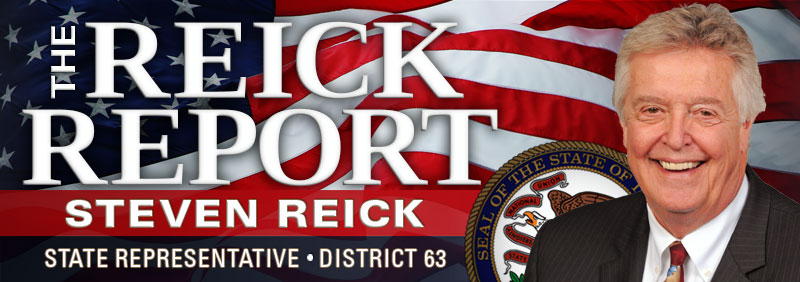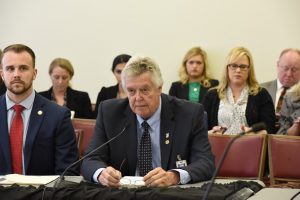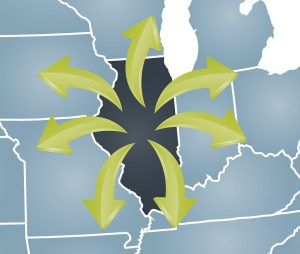First Week of 2018 Session Cancelled
Last Friday we learned that the first scheduled session days on the 2018 calendar (January 23 and 24) were cancelled. While I was looking forward to beginning our 2018 work in Springfield, I am spending this week working on local projects and meeting with constituents. The first day of the 2018 session year will now be Tuesday, January 30. On Wednesday the 31st, Governor Bruce Rauner will present his annual State of the State address before a joint session of the House and Senate. This speech is streamed live on the state’s web site. If you would like to tune in to the Governor’s noon address on January 31, visit www.ilga.gov, and click on the link for Audio/Video.
Rep. Steve Reick Files Legislation to Require Cost Study to Ensure Township Road District Consolidations Save Money
Governor Rauner Vetoes Bill to Increase Powers of McHenry County Board Chairman
 In a solid victory for the citizens of McHenry County, Governor Bruce Rauner recently issued a full veto of HB 171, which would codify in state statutes powers granted to specific county board chairmen with regard to appointing members to standing committees. The bill was written to specifically apply to McHenry County, in spite of the fact that in 2012 county voters voted 2:1 against a referendum that would expand the powers of the leader of the McHenry County Board.
In a solid victory for the citizens of McHenry County, Governor Bruce Rauner recently issued a full veto of HB 171, which would codify in state statutes powers granted to specific county board chairmen with regard to appointing members to standing committees. The bill was written to specifically apply to McHenry County, in spite of the fact that in 2012 county voters voted 2:1 against a referendum that would expand the powers of the leader of the McHenry County Board.
State-Sponsored School Library Grants Approved for 11 Districts Located within the Reick House District
I was pleased to learn recently that $17,381 in state-sponsored school library grant money will soon be flowing to 11 school districts located in the 63rd Legislative District. The School District Library Grant Program is designed to help provide more library books and materials for students attending public schools in Illinois. The state legislature has authorized up to a $.75 per pupil expenditure for qualifying schools. The grant award is based on funds appropriated by the General Assembly and the official enrollment as of the previous September 30th of a school district. Specifically, the following grants are being processed by the Secretary of State’s Office and will then be forwarded to the Comptroller’s office for payment:
- Harvard CUSD #50: $1,865.25
- Alden-Hebron Community Consolidated Unit #19: $750.00
- Johnsburg CUSD #12: $1,359.00
- Riley Community Consolidated School District #18: $750.00
- Marengo-Union Community School District #165: $750.00
- Marengo Community High School District #154: $750.00
- McHenry CCSD #15: $3,262.50
- McHenry Community High School District #156: $1,669.50
- Nippersink School District #2: $845.25
- Richmond Burton CHSD #157: $750.00
- Woodstock CUSD #200: $4,629.75
Reick and Wheeler Petition ICC for Local Hearing on Proposed Utilities, Inc. Rate Hike
IL Department of Veterans Affairs to Honor 200 Veterans During “Honor 200” Event
Illinois Depart of Veterans’ Affairs
George Dunne County Building
69 West Washington, Suite 1620
Chicago, IL 60602-3013
Illinois Loses 88,000 People During Economic Recovery
On Thursday, January 18, Amazon released a list of 20 cities and metro areas, including Chicago, that meet the criteria set forth by the company for the location of a second national headquarters. In late 2017, Amazon asked cities in North America to submit plans and proposals to initiate a major expansion. The stated criteria for selecting a location for potential expansion included a city within an urban area with more than one million people and within 45 minutes of an international airport. The presence of mass-transit infrastructure was described as strongly desirable but not essential. The firm stated that it was their intent to create a research, development, and logistics management complex that could support as many as 50,000 jobs. Other major cities on the list included Atlanta, Boston, Dallas, Denver, Los Angeles, New York City and northern New Jersey, Philadelphia, and Washington, D.C. and the Capital Beltway.
Trustees Approve Fourth Consecutive Tuition Freeze at University of Illinois
The tuition freeze, now in its fourth year, reflects efforts made by the University of Illinois trustees and system to limit cost increases and make it possible for in-state residents to afford to attend the state’s flagship university. As a result of the freeze, Illinois residents accepted for admission at the three universities that form the University of Illinois system will pay $12,036 a year at Urbana-Champaign (UIUC), $10,584 at Chicago (UIC), and $9,405 at Springfield (UIS). The tuition freeze continues to provide relief for many in-state students attending the three campuses of the University of Illinois. However, the freeze does not affect other costs of enrollment at UIUC, UIC, and UIS. Costs relating to housing, meals, student fees, and education-related expenses such as textbooks continue to increase.
New Law Increases Penalties for Repeat Gun Offenders
The Safe Neighborhoods Reform Act went into effect January 1. Enacted with support from law enforcement and prosecution professionals, the new law doubles the sentencing guidelines for offenders found guilty, for a second time, of illegal possession of a firearm. House Republican Leader Jim Durkin (R-Western Springs), the lead House sponsor of SB 1722, hailed the new law upon its effective date. I was proud to support this legislation that increases penalties for repeat offenders.
In addition to the unlawful use of a weapon language, SB 1722 also expands the use by first-time firearm offenders of the First Time Weapon Offender Program. Leader Durkin and the General Assembly are fighting to increase penalties for serious gun offenders, many of them gang members, while at the same time providing a second chance to first-time gun offenders who undergo a serious program of rehabilitation and behavioral change. Under SB 1722, the Director of the Illinois State Police is authorized to create a multi-jurisdictional Violent Crime Intelligence Task Force to further study violent and gang-related crime and make additional recommendations for legislative action.




